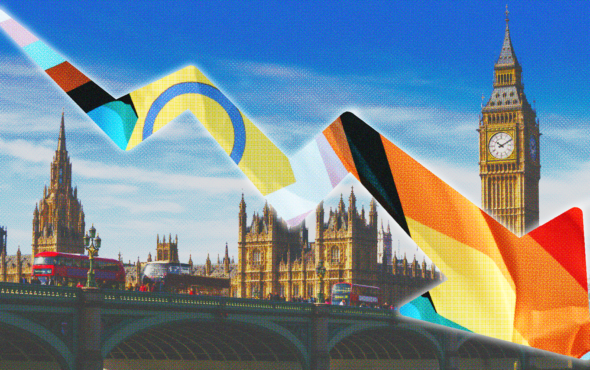
A humanitarian crisis has been unfolding over the past three weeks in the Gaza Strip. In response, GAY TIMES will be publishing editorial content calling for international queer solidarity with the Palestinian people.
Below, we begin with an explainer of events which have taken place from 7 October onwards.
On 7 October, Hamas launched an attack on southern Israel, killing 1,405 people. It has been reported that the group also took at least 200 soldiers and civilians as hostages. Like the rest of the world, GAY TIMES condemns this action taken by Hamas and the violence inflicted on the victims.
Hamas is classed as a terrorist organisation by Israeli, UK, US and EU governments, among others. It aims to create an Islamic state within the borders of historic Palestine, territory which includes what is currently recognised as the Israeli state.
After the 7 October attacks, Israeli forces have killed over 7800 Palestinians in the Gaza Strip via air bombardments. The UN’s humanitarian office reports that at least 45% of all housing in the region has been destroyed.
The Human Rights Watch has also reported and condemned the use of artillery-fired white phosphorus in Gaza City and along the Israeli-Lebanese border. White phosphorus is an incendiary material, human exposure to which causes deep dermal burns and severe damage to the eyes and respiratory tract.
On 12 October, Israeli forces ordered 1.1 million individuals in the north Gaza Strip to move south within 24 hours – though warplanes continued to attack areas in southern Gaza. At present, around 1.4 million people, 60 percent of the Gaza Strip’s population, have been internally displaced.
Israeli troops and tanks are currently launching a ground invasion in the north of the Gaza Strip.
The Gaza Strip blockade
As UN Secretary General Antonio Guterres has stated; “the attacks by Hamas did not happen in a vacuum.”
There are two Palestinian enclaves on either side of current-day Israel: the Gaza Strip and the West Bank.
The Gaza Strip has been under an indefinite blockade by Israel since Hamas rose to power in 2007. This has impeded the flow of goods into the Gaza Strip and also restricts the movement of Palestinian individuals out of the Gaza Strip.
Omar Shakir, Israel and Palestine director at Human Rights Watch has described the blockade as an “open-air prison”. Beyond the human rights implications of the blockade, UNRWA, the UN agency for Palestinian refugees, has estimated that 80% of the Gazan population lives in poverty.
The blockade has become even more stringent since 7 October, when Israeli Defence Minister Yoav Gallant announced; “We are putting a complete siege on Gaza. No electricity, no food, no water, no gas – it’s all closed.”
This has created critical shortages of basic supplies including water, medicine, fuel and food. Electricity was cut off by Israel at the beginning of the blockade and bombardments have destroyed the Gaza Strip’s internet and telephone infrastructure, leaving the area in a communication blackout.
With the internet and phones no longer working, there’s a scarcity of real-time updates coming from individuals within the Gaza Strip. This means that attacks by the Israeli army may take place without scrutiny from the international community, and will leave Palestinian civilians unaware of the areas being targeted.
What does international law say?
The 7 October attack by Hamas constitutes a violation of international humanitarian law on multiple fronts, including hostage taking and the targeting of civilians.
It has also been agreed under the Geneva Convention (which Israel ratified in 1951) that the breaking of these laws – no matter the nature of conflict – does not justify similar crimes as a form of retaliation.
After the Hamas attacks, the Israeli government has similarly failed to differentiate between soldiers and civilians, launching attacks on the densely populated Gaza Strip, wherein nearly half of the population are children.
Israeli officials have also not fulfilled their requirements under law to allow aid to the Gazan people and have used the blockade to implement starvation as a tool of war.
Alongside these actions, rhetoric from Israeli officials has strengthened the notion that Palestinian civilians are being subject to collective punishment from the Israeli government, itself also a breach of international law.
For example, Israeli President, Isaac Herzog, has asserted his belief that; “It’s an entire nation out there that is responsible – it’s not true this rhetoric about civilians not aware, not involved, it’s absolutely not true.”
Francesca Albanese, UN Special Rapporteur on the occupied Palestinian territories, has warned that Israel’s actions could constitute a mass ethnic cleansing.
Who has spoken out?
The UN Secretary General and the UN High Commissioner for Human Rights, alongside prominent international charity organisations such as Amnesty International, are all calling for an immediate ceasefire.
These calls have been echoed by a host of UK-based charities working on the ground in Palestine such as Islamic Relief, Medical Aid for Palestinians, Amos Trust and War on Want.
Additionally, 290 organisations from 50 countries have signed an open letter organised by Global Centre for the Responsibility to Protect making similar demands.
On 27 October, the UN General Assembly passed a resolution calling for an “immediate, durable and sustained humanitarian truce” to the conflict. This was passed with 120 votes for, 14 against and 45 abstentions – with the US voting against and the UK abstaining.
Why should we speak out?
The current Israeli-Gaza war is just one chapter in an ongoing conflict which has taken place over the course of 75 years.
Due to the years and layers of history, there are conflicting narratives across social media and the international press – some of which point to criticism of the Israeli government as a form of antisemitism, or as an endorsement of Hamas.
However, it is possible to condemn the killing of Israeli civilians by Hamas while also condemning the response by the Israeli government.
The ongoing unrest between Palestine and Israel is also often framed as a religious dispute between Jewish Israelis and Muslim-majority Palestinians. This can make speaking out about the conflict feel fraught, especially considering the ongoing persecution faced by Jewish individuals across the world. But Israeli state actors do not reflect the beliefs of Jewish people globally or individuals within Israel, nor does Hamas reflect those who endorse a Free Palestine.
Where these two parties are often framed as participating in an equal conflict, Gazans have been under siege for 15 years, with Israeli army officials deciding whether they have access to electricity, water and food, as well as deciding whether they can travel or go to work and school. The Israeli army, on the other hand, received 3.8 billion dollars in US military aid in 2020 alone.
To critique the Israeli government’s treatment of Palestinian civilians is not anti-semitism. Ongoing human rights abuses are taking place and speaking out is a necessary intervention in favour of humanity.
In light of this, hundreds of thousands of protestors have taken to the streets in cities like Hebron, London, Wellington, Baghdad, Kuala Lumpur, Marseille, Paris, Istanbul, Rome, Copenhagen, Stockholm and New York, as well as the Indian state of Kerala, in an act of Palestinian solidarity and to call for an immediate ceasefire.
This includes individuals of all faiths and ethnicities, with Jewish activist groups – including the US-based Jewish Voice for Peace, UK groups Jews for Justice for Palestine and Black Jewish Alliance, and the international orthodox Jewish anti-zionist group Neturei Karta fervently fighting in favour of Palestinian justice.
Within Israel, protestors have gathered outside of President Benjamin Netanyahu’s home in the town of Caesarea and outside of Economy Minister Nir Barkat’s home in Jerusalem, demanding a ceasefire and the release of Palestinian prisoners.
Hamas has demanded that Palestinian prisoners in Israel be released in exchange for the release of Israeli and foreign hostages held in Gaza.
What next?
To support the people of Palestine, individuals in the UK and US need to place urgent pressure on their governments to use their influence to call for an immediate ceasefire.
Resharing verified information shedding light on the situation in Palestine or voicing sympathy for the Palestinian cause on social media can be an important exercise in raising awareness – but don’t let your activism stop there.
While humanitarian aid has had difficulty accessing affected communities within Gaza, they are still in need of urgent donations in order to attend to the crisis as and when they can. Verified charities working on the ground to provide medical and humanitarian aid include Medical Aid for Palestinians, Islamic Relief and UNICEF.
With protests taking place across the UK and US, you can attend a local march and show your solidarity with the people of Palestine. However, there are more specific actions you can take depending on where you are based.
UK
The Palestine Solidarity Campaign (PSC) is asking individuals to email their MP urging them to sign Early Day Motion 1685, which calls on the UK government to press for an immediate ceasefire and an end to the siege on the Gaza Strip.
At the time of writing, the motion has 95 signatures out of a total of 650 MPs – there’s a lot to be done. To urge your MP to sign, you can use the PSC tool here.
US
The US Campaign for Palestinian Rights is urging US residents to call Congress to demand support for a ceasefire and has provided a resource to help you reach the relevant representative – complete with a script. Access it here.
The anti-zionist Jewish organisation Jewish Voice for Peace has provided tools to contact President Biden, Congress and the New York Times editorial board to advocate for a ceasefire. Access them here.
Note: A previous version of this article described Hamas as a “resistance group who are the de facto leaders of Gaza” as well as outlining they have been designated a terrorist organisation by Israel, UK, US and the EU. We have updated the article to remove “resistance group” and only refer to them as a “terrorist organisation”.
Further to that, the GAY TIMES editorial team have issued a statement here.


